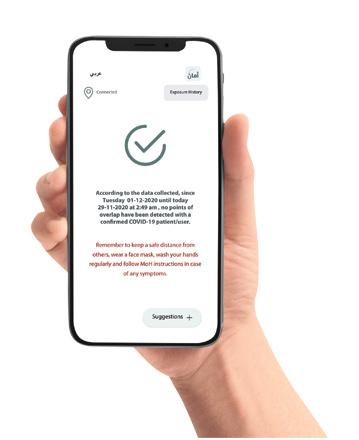- Local News
- Web-2020-12-02 | 12:30 pm

The Aman app’s usefulness is under question: While some say that its use is both necessary and helpful, others disagree. Health Minister Nazir Obeidat said recently that the application is "no longer achieving the desired outcome.
The Ministry of Health in May launched the "Aman” ("Safety”) app, which alerts users when they are suspected of having been exposed to COVID-19 and when they have been in contact with a person who is infected.
"Aman is supposed to send notifications to anyone who has been in close contact with an infected person, but as the number of infections has increased, the app is no longer able to do that,” the health minister said.
Many citizens have reported discrepancies in the application, as some users apparently have someone in their household who has tested positive but never received a notification.
"My son has been infected, has quarantined and tested negative two weeks ago. I never got any notification even though it has been a month since his infection,” said Dalal Omari, a lawyer.
Omari added: "However, every day I receive at least two notifications of having been at "extreme risk” at the gas station next to us. I get this notification every day, telling me I was at the gas station at different times, but neither the dates nor the time is accurate.”
She noted that "even if I were at the gas station at the time the app says I was, dealing with a masked gas attendant while sitting in my car could not possibly be riskier than living with my son.”
On social media, citizens have expressed that the application’s job is to "frighten them several times a day”.
"I keep getting a notification that I had a high risk encounter near City Mall, but I live in Irbid and the last time I visited the City Mall was probably in 2016,” said Mohammad Nobani.
Nobani added: "I am not bothered that the application shows me that I was at a high risk in a place I was not actually in, but I am bothered by the fact that this randomness could mean that there are dangerous encounters I am not being alerted of.”
In reply to these complaints, the group of tech-savvy volunteers behind Aman issued a statement, saying that "from day one, the app as well as the information and solutions it provides have been helpful in limiting the spread of the virus in Jordan.”
Regarding Obeidat’s remarks, the Aman team said: "The minister of health was correct in saying that the effectiveness of the epidemiological investigation…, in light of the increased number of cases and a limited ability to conduct tests, has decreased. We are no longer following the interaction of dozens of people, but of hundreds of thousands.”
However, the app programmers noted, "the desired outcome of the application will be achieved again once this wave of coronavirus recedes. Let us also not forget the additional value that decision-makers are gaining from the analytical data available through the application.”
Murad Khalil, a university student who was infected, said that the creators of the app "called him personally to transfer his location data” since he had turned it off some days before his infection.
"To be honest, I thought that the app was no longer useful and it was taking too much battery so I turned off my phone’s location services. A day or two after my infection, someone from the app called and told me to transfer the data manually — an option in the app — as they could still benefit from the data collected when the app was on,” he added.
The Aman concluded: "We know since the first day of our launch that there would have been challenges to be faced. The limited awareness of information systems and their mechanisms by the public, the lack of coherence between government systems and the lack of belief in the necessity of developing integrated and effective solutions are the challenges that we faced. However, we work today with more hope and determination than before.”









